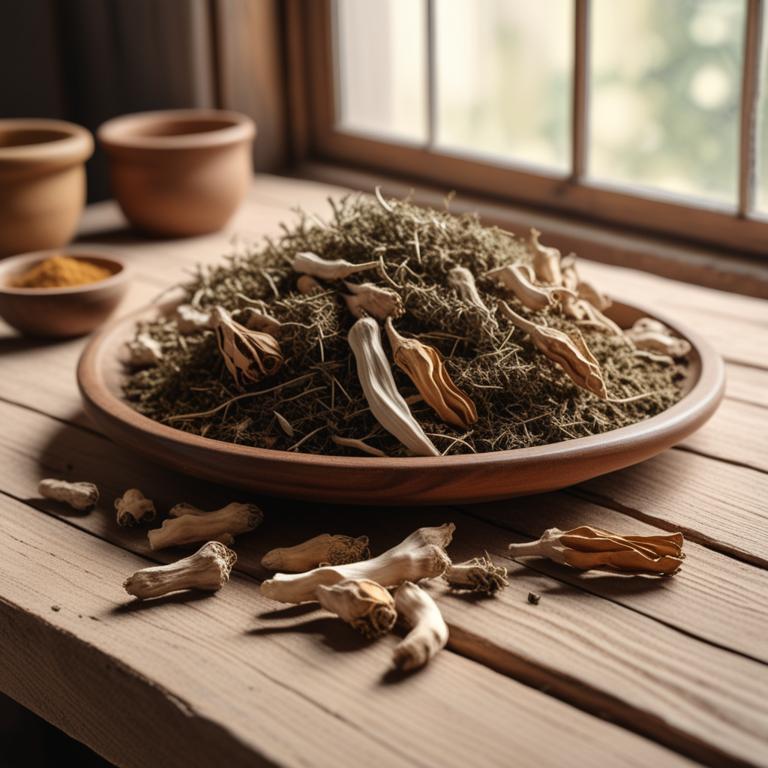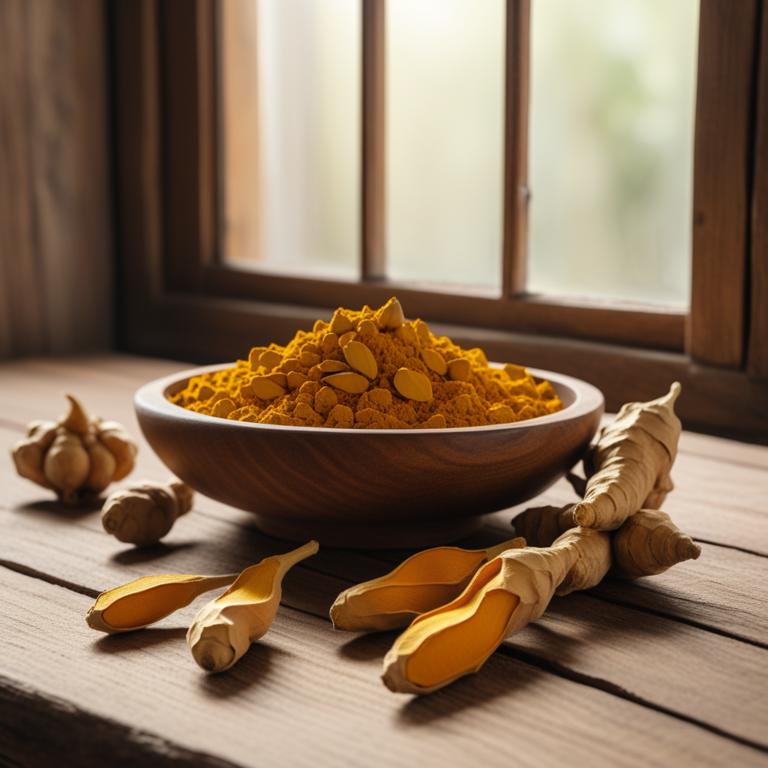Updated: Dec 1, 2024
The Complete Guide to Acute Bronchitis: Causes, Medicinal Herbs, and Herbal Preparations
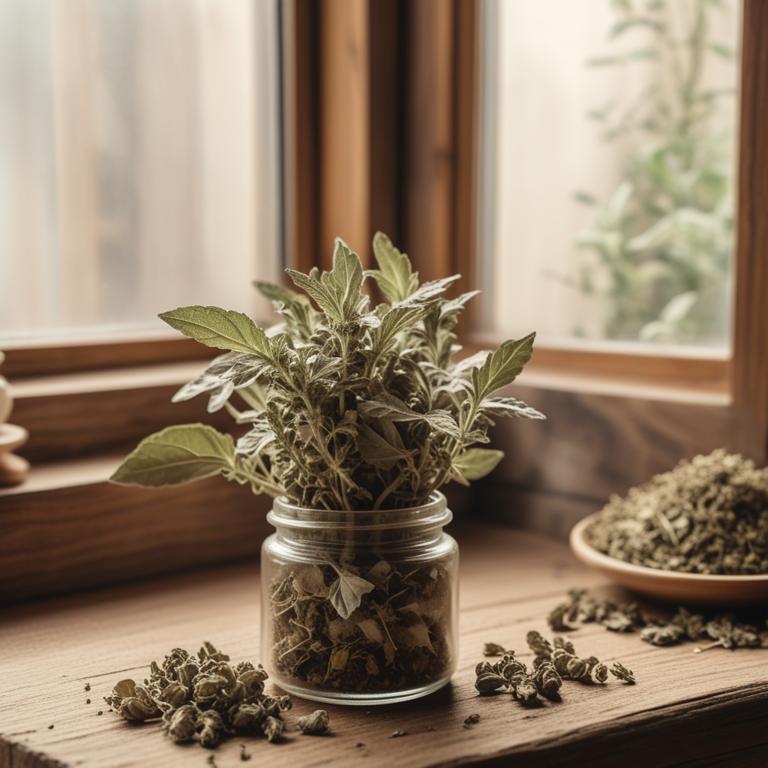
Acute bronchitis is a common illness that affects your lungs and airways, causing a persistent cough, mucus production, and shortness of breath.
It can be quite debilitating, making everyday activities feel like a struggle. Typically, acute bronchitis is caused by a viral or bacterial infection, which can be triggered by factors like smoking, pollution, or exposure to airborne pathogens. Herbs like thyme, ginger, and slippery elm have been used for centuries to help alleviate the symptoms of acute bronchitis. Thyme, in particular, is known for its antimicrobial properties, which can help combat bacterial infections.
Ginger is a natural anti-inflammatory, which can help reduce inflammation and ease congestion. Slippery elm, on the other hand, has a soothing effect on the mucous membranes, helping to calm a persistent cough. To harness the healing properties of these herbs, you can prepare them in various ways. Thyme and ginger can be made into a warm tea by steeping the herbs in hot water, while slippery elm can be taken as a supplement or added to a warm bath for relief. You can also find thyme and ginger in capsule or tincture form, making it easy to incorporate them into your daily routine.
By incorporating these herbal remedies into your treatment plan, you may find relief from the symptoms of acute bronchitis and get back to living your normal life.
Table of Contents
- What are the root causes of acute bronchitis?
- What are the benefits of using herbal medicine for acute bronchitis?
- What are the most effective medicinal herbs for acute bronchitis treatment?
- What are the leading herbal supplements for acute bronchitis?
- What herbs might cause complications with acute bronchitis?
- FAQ
What are the root causes of acute bronchitis?
The main causes of acute bronchitis are often related to infections or irritants that inflame the airways.
A viral infection is the most common cause, as it can easily spread and affect the respiratory system. This type of infection can be caused by various viruses, including the respiratory syncytial (RS) virus, which is particularly common in young children.
Another significant cause is bacterial infection, which can occur when a viral infection has weakened the body's defense system, making it easier for bacteria to enter and cause further inflammation. Tobacco smoke is also a major risk factor, as it irritates the airways and makes them more susceptible to infection. Smoking damages the cilia in the bronchial tubes, which are essential for clearing mucus and debris, leading to prolonged inflammation and increased susceptibility to infections.
Additionally, exposure to respiratory viruses, such as the common cold virus, can also trigger acute bronchitis in some individuals.
What are the benefits of using herbal medicine for acute bronchitis?
Using herbs for acute bronchitis can be very beneficial.
These natural remedies can help to loosen and clear mucus from your airways, making it easier to breathe. They can also reduce inflammation and soothe a sore throat, which can be painful and annoying.
By fighting off infection and calming your respiratory system, herbs can help to bring down a fever and reduce the severity of symptoms like coughing and congestion. Additionally, many herbs have antimicrobial properties, which can help to prevent the spread of infection and speed up the healing process. Some herbs may also help to boost your immune system, making you less likely to get sick in the first place.
By using herbs to treat acute bronchitis, you can reduce your reliance on prescription medications and promote a faster, more natural recovery.
What are the most effective medicinal herbs for acute bronchitis treatment?

Herbs can be a great way to help alleviate symptoms of acute bronchitis.
One of the most commonly used herbs for this condition is Eucalyptus globulus. This herb contains compounds that help break down mucus, making it easier to cough up and breathe. Eucalyptus also has anti-inflammatory properties that can help reduce swelling in the airways. Another herb that's often used to combat bronchitis is Echinacea purpurea. This herb is known for its immune-boosting properties, which can help your body fight off the underlying infection that's causing your symptoms. Echinacea also has anti-inflammatory properties that can help reduce inflammation in the lungs. Glycyrrhiza glabra, or licorice root, is another herb that's commonly used to soothe bronchitis symptoms. It has anti-inflammatory properties that can help reduce inflammation in the airways, making it easier to breathe.
Glycyrrhiza also has a soothing effect on the mucous membranes, which can help reduce coughing. Thymus vulgaris, or thyme, is another herb that's often used to help alleviate bronchitis symptoms. It contains compounds that help break down mucus, making it easier to cough up and breathe. Thyme also has antimicrobial properties that can help combat the underlying infection that's causing your symptoms. Finally, Zingiber officinale, or ginger, is an herb that's often used to help soothe bronchitis symptoms. It has anti-inflammatory properties that can help reduce inflammation in the airways, making it easier to breathe. Ginger also has a soothing effect on the mucous membranes, which can help reduce coughing. When using these herbs, it's often best to consume them in a tea form, or to add them to a warm bath. This can help the compounds in the herbs penetrate deeper into the body, where they can do the most good.
It's also a good idea to consult with a healthcare professional before using any new herbs, especially if you have any underlying health conditions or are taking any medications.
What are the leading herbal supplements for acute bronchitis?
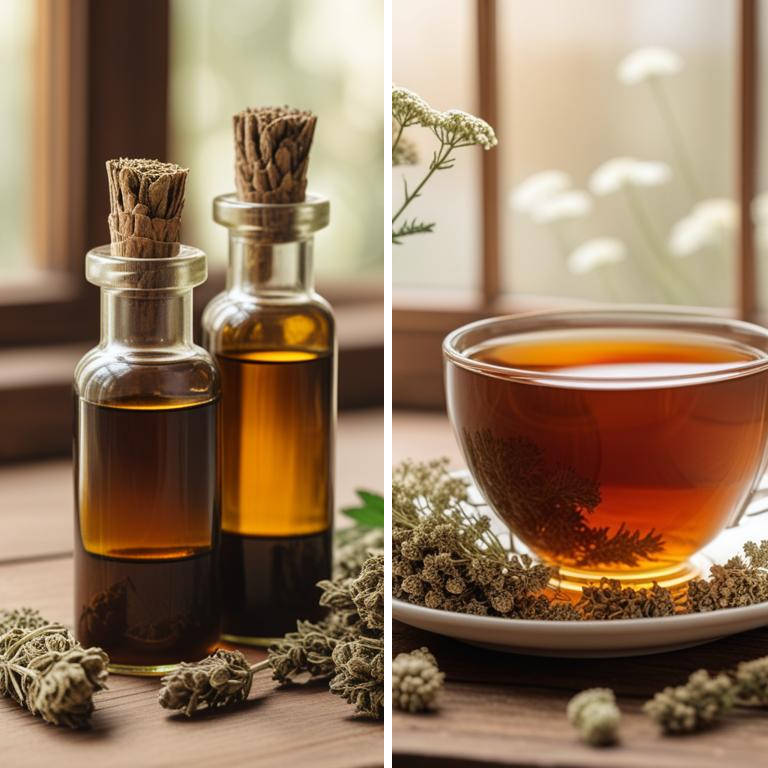
When it comes to treating acute bronchitis, herbal preparations can be a great help.
A decoction, which is made by boiling herbs in water, can help loosen and clear mucus from the lungs. This is especially helpful when you have a productive cough, where you're coughing up thick mucus. A decoction of thyme, for example, can help ease congestion and fight off infections. An infusion, on the other hand, is made by steeping herbs in hot water and then straining them out. This can be a soothing way to calm a sore throat and ease a cough. A peppermint infusion, for instance, can help calm your throat and make it easier to breathe. A tincture is a concentrated liquid made by steeping herbs in a solvent like alcohol or glycerin. Tinctures can be taken sublingually (under the tongue), which allows them to be absorbed quickly into the bloodstream.
A tincture of eucalyptus, for example, can help ease congestion and open up airways. A cup of herbal tea can also be very comforting when you have acute bronchitis. The warm liquid can help soothe your throat and ease a cough. A tea made from ginger, for instance, can help reduce inflammation and ease congestion. Finally, a salve can be used to apply herbal remedies directly to the skin. This can be especially helpful when you have a persistent cough or congestion that's hard to shake. A salve made from eucalyptus oil, for example, can be applied to your chest to help ease congestion and open up airways. Herbs like thyme, peppermint, eucalyptus, and ginger have been used for centuries to help treat respiratory issues like bronchitis. They work by reducing inflammation, loosening mucus, and fighting off infections.
By using these herbal preparations in various forms, you can help alleviate symptoms and feel better faster.
Additional Resources:
What herbs might cause complications with acute bronchitis?
If you have acute bronchitis, it's best to be careful when using certain herbs.
Rosmarinus officinalis, also known as rosemary, can be too stimulating for your airways, making your symptoms worse. It can cause your airways to constrict, making it harder to breathe. Aristolochia clematitis, a type of birthwort, contains a toxic compound that can damage your kidneys and liver. When your body is fighting an infection like bronchitis, it needs all its energy to recover. Using birthwort can harm your organs and slow down your healing process. Rauvolfia serpentina, also known as Indian snakeroot, can lower your blood pressure too much, which is not good when you have a respiratory infection.
Your body needs a good blood flow to fight off the infection and recover. Low blood pressure can make you feel dizzy and weak. Salvia miltiorrhiza, a type of sage, has some compounds that can affect your heart rate and blood pressure. When you have bronchitis, your heart is already working hard to pump blood to your lungs. Adding sage to the mix can cause your heart rate to drop or your blood pressure to rise, making your symptoms worse. Nerium oleander, also known as oleander, is highly toxic and should be avoided altogether.
Its compounds can cause heart problems, seizures, and even death, especially in people who are already ill.
FAQ
Are there any specific herbs that can prevent acute bronchitis?
Ginger and thyme have been traditionally used to help soothe and calm irritated airways.
Ginger's anti-inflammatory properties may reduce swelling in the bronchial tubes, while thyme's antimicrobial properties can help combat infections that cause acute bronchitis.
These herbs may help alleviate symptoms and support the body's natural healing process.
Is it safe to use herbal remedies for acute bronchitis during pregnancy?
When pregnant, it's a good idea to be cautious with herbal remedies for acute bronchitis.
Some herbs, like eucalyptus and peppermint, might help relieve symptoms, but others, like foxglove and aloe, could be a problem for the baby.
It's best to talk to your doctor about what's safe to use.
Are there any herbs that can reduce the frequency of acute bronchitis?
Ginger and thyme are herbs that may help reduce the frequency of acute bronchitis.
Ginger has anti-inflammatory properties that can soothe the throat and airways, while thyme has antimicrobial properties that can fight off infections.
Drinking tea made with these herbs may provide some relief and help alleviate symptoms.
Can i combine different herbal remedies for acute bronchitis?
Combining herbal remedies for acute bronchitis can be tricky.
Some herbs, like thyme and eucalyptus, may help soothe your cough and ease congestion. However, combining them with other herbs like slippery elm or licorice root could potentially interact and worsen symptoms.
It's best to start with small amounts and observe how your body reacts.
Related Articles
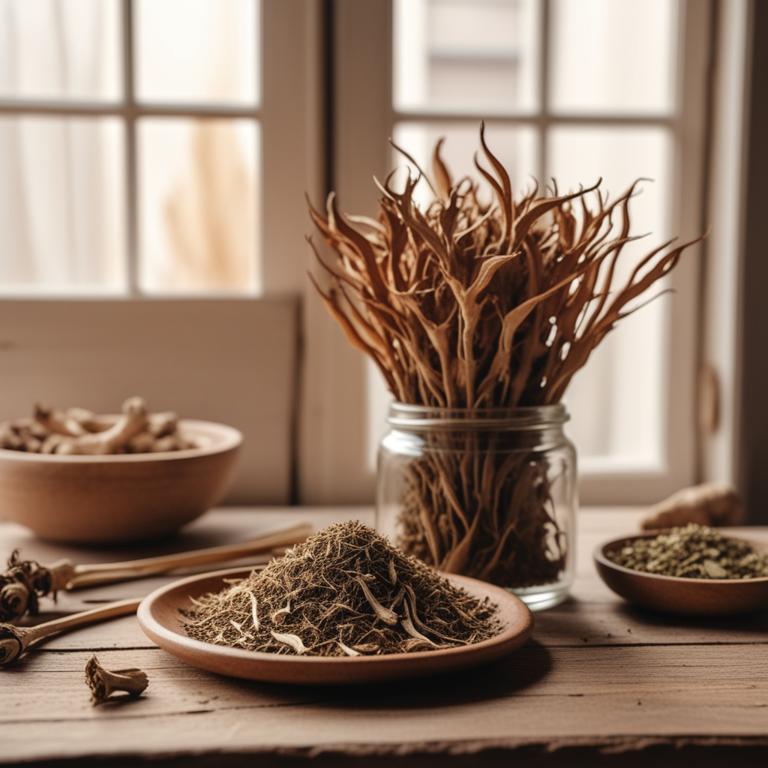
Hoarse Voice: Understanding Causes and Using Medicinal Herbs and Herbal Preparations
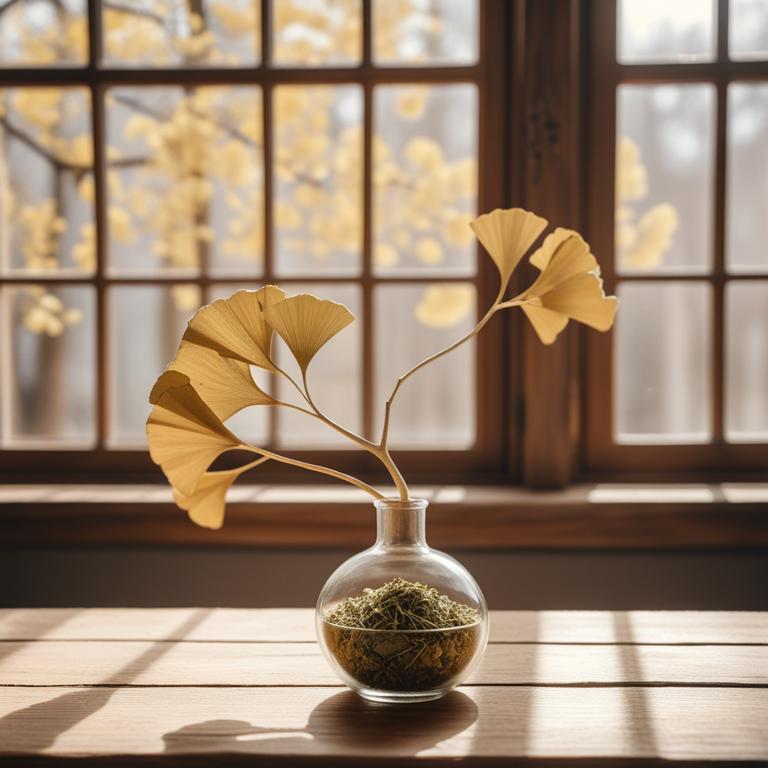
Altitude Sickness Prevention: Causes, Medicinal Herbs, and Natural Remedies
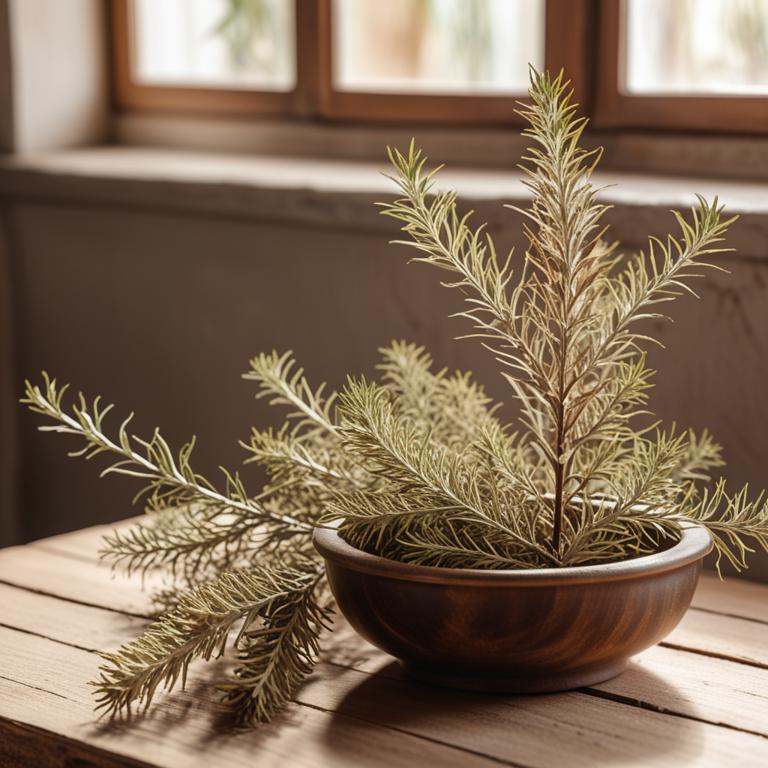
Ear Blockage: Exploring Medicinal Herbs and Natural Remedies
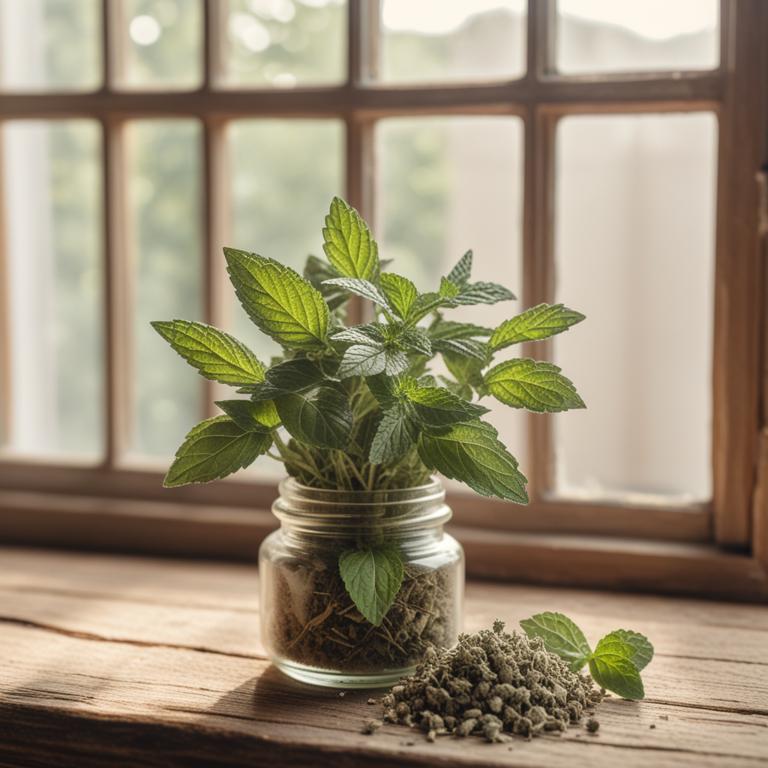
Laryngitis: Causes, Symptoms, and Herbal Preparations for Relief

Snoring: Causes, Herbal Remedies, and a Good Night's Sleep




